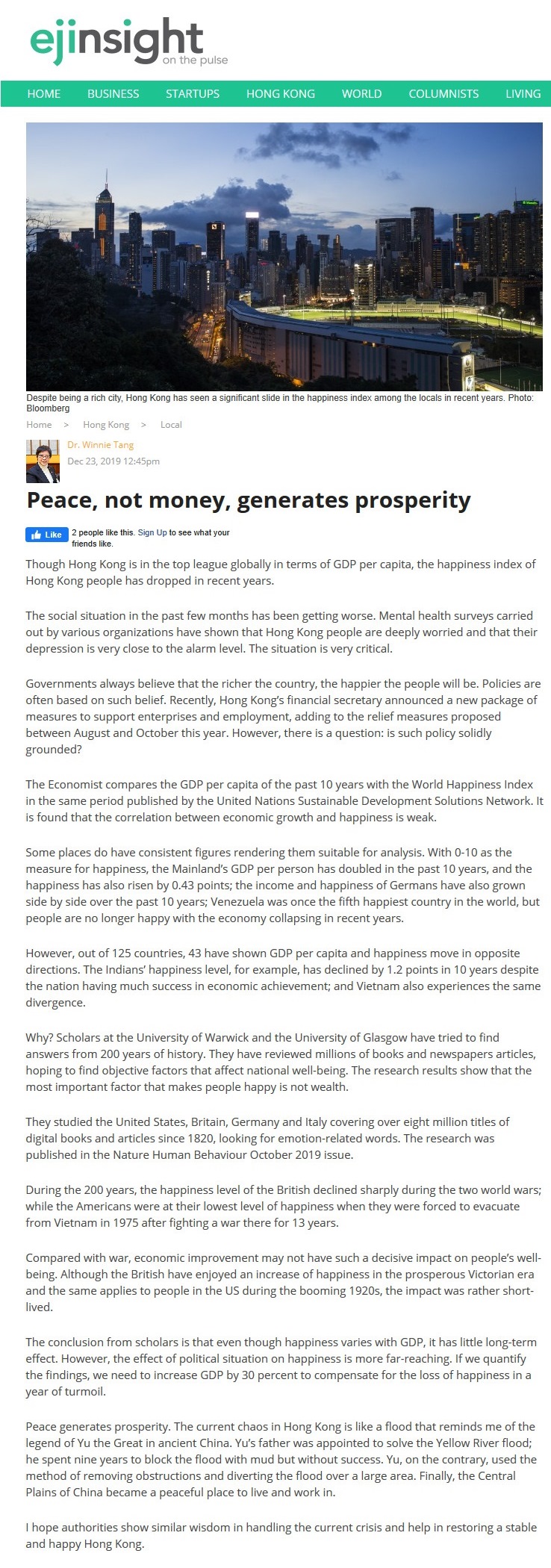網上版請按此

Peace, not money, generates prosperity
Though Hong Kong is in the top league globally in terms of GDP per capita, the happiness index of Hong Kong people has dropped in recent years.
The social situation in the past few months has been getting worse. Mental health surveys carried out by various organizations have shown that Hong Kong people are deeply worried and that their depression is very close to the alarm level. The situation is very critical.
Governments always believe that the richer the country, the happier the people will be. Policies are often based on such belief. Recently, Hong Kong's financial secretary announced a new package of measures to support enterprises and employment, adding to the relief measures proposed between August and October this year. However, there is a question: is such policy solidly grounded?
The Economist compares the GDP per capita of the past 10 years with the World Happiness Index in the same period published by the United Nations Sustainable Development Solutions Network. It is found that the correlation between economic growth and happiness is weak.
Some places do have consistent figures rendering them suitable for analysis. With 0-10 as the measure for happiness, the Mainland's GDP per person has doubled in the past 10 years, and the happiness has also risen by 0.43 points; the income and happiness of Germans have also grown side by side over the past 10 years; Venezuela was once the fifth happiest country in the world, but people are no longer happy with the economy collapsing in recent years.
However, out of 125 countries, 43 have shown GDP per capita and happiness move in opposite directions. The Indians' happiness level, for example, has declined by 1.2 points in 10 years despite the nation having much success in economic achievement; and Vietnam also experiences the same divergence.
Why? Scholars at the University of Warwick and the University of Glasgow have tried to find answers from 200 years of history. They have reviewed millions of books and newspapers articles, hoping to find objective factors that affect national well-being. The research results show that the most important factor that makes people happy is not wealth.
They studied the United States, Britain, Germany and Italy covering over eight million titles of digital books and articles since 1820, looking for emotion-related words. The research was published in the Nature Human Behaviour October 2019 issue.
During the 200 years, the happiness level of the British declined sharply during the two world wars; while the Americans were at their lowest level of happiness when they were forced to evacuate from Vietnam in 1975 after fighting a war there for 13 years.
Compared with war, economic improvement may not have such a decisive impact on people's well-being. Although the British have enjoyed an increase of happiness in the prosperous Victorian era and the same applies to people in the US during the booming 1920s, the impact was rather short-lived.
The conclusion from scholars is that even though happiness varies with GDP, it has little long-term effect. However, the effect of political situation on happiness is more far-reaching. If we quantify the findings, we need to increase GDP by 30 percent to compensate for the loss of happiness in a year of turmoil.
Peace generates prosperity. The current chaos in Hong Kong is like a flood that reminds me of the legend of Yu the Great in ancient China. Yu's father was appointed to solve the Yellow River flood; he spent nine years to block the flood with mud but without success. Yu, on the contrary, used the method of removing obstructions and diverting the flood over a large area. Finally, the Central Plains of China became a peaceful place to live and work in.
I hope authorities show similar wisdom in handling the current crisis and help in restoring a stable and happy Hong Kong.
Dr. Winnie Tang
Adjunct Professor, Department of Computer Science, Faculty of Engineering and Faculty of Architecture, The University of Hong Kong